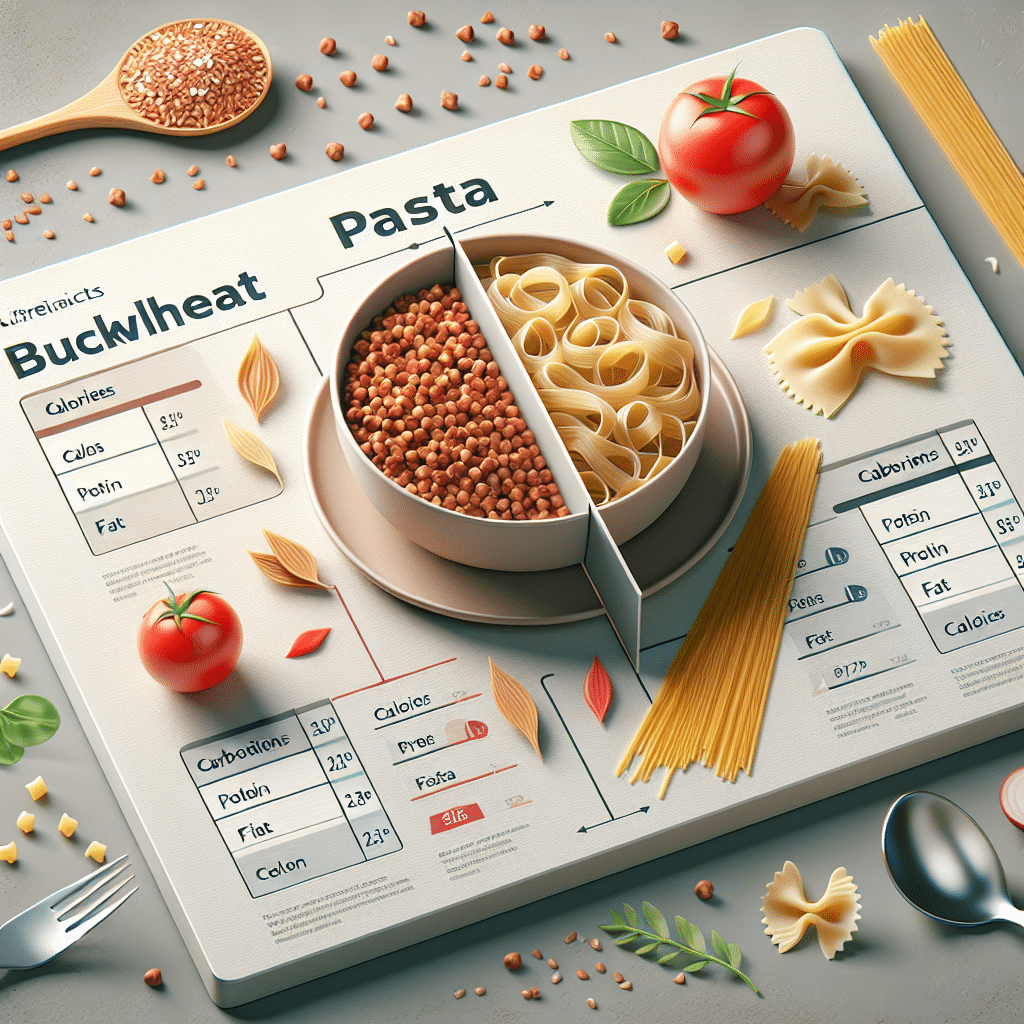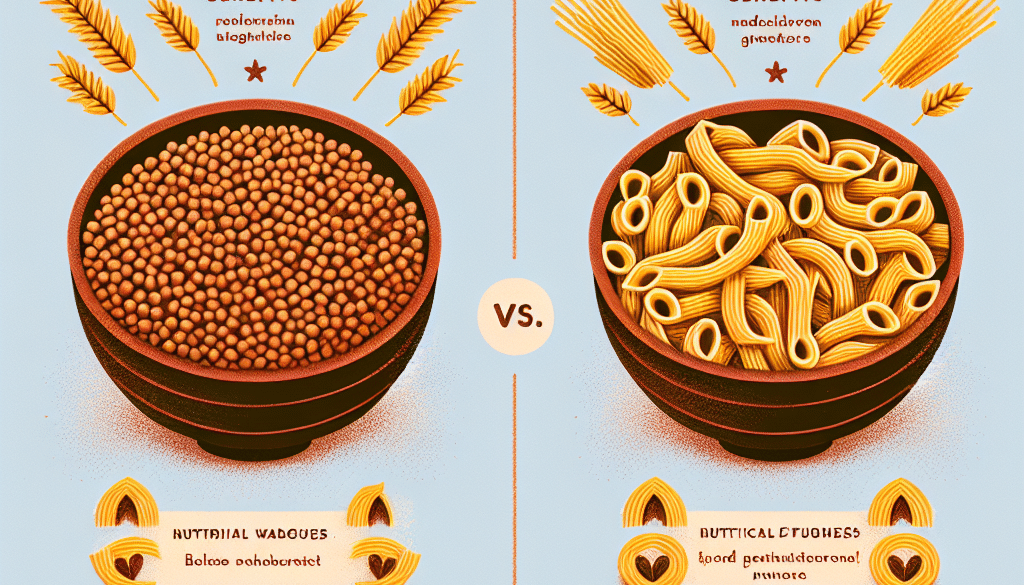Is Buckwheat Healthier Than Pasta?
-
Table of Contents
- Buckwheat vs. Pasta: A Comprehensive Health Comparison
- Understanding Buckwheat
- The Basics of Pasta
- Nutritional Breakdown: Buckwheat vs. Pasta
- Health Benefits of Buckwheat
- When Pasta Can Be a Healthy Choice
- Comparative Studies and Statistics
- Personal Dietary Considerations
- Conclusion: Making the Healthier Choice
- Enhance Your Diet with ETprotein’s Protein Products
Buckwheat vs. Pasta: A Comprehensive Health Comparison

When it comes to choosing healthy foods, the debate between various types of grains and carbohydrates is ongoing. Among the many options available, buckwheat and pasta often come up in discussions about nutrition, weight management, and overall health. This article delves into the health benefits and considerations of both buckwheat and pasta, providing a detailed comparison to help you make informed dietary choices.
Understanding Buckwheat
Buckwheat, despite its name, is not related to wheat and is actually a gluten-free seed. It’s a pseudocereal, similar to quinoa and amaranth, and is highly regarded for its nutritional profile. Buckwheat is rich in minerals such as magnesium, copper, and manganese and is a good source of dietary fiber. It also contains a variety of antioxidants and has a low glycemic index, which means it has a slower impact on blood sugar levels.
The Basics of Pasta
Pasta, a staple in many diets around the world, is typically made from wheat flour, water, and sometimes eggs. While it is a good source of energy, traditional pasta can be high in carbohydrates and may have a higher glycemic index compared to buckwheat. However, pasta can also be enriched with vitamins and minerals, and whole-grain versions offer more fiber and nutrients than refined varieties.
Nutritional Breakdown: Buckwheat vs. Pasta
- Calories: Buckwheat is lower in calories compared to traditional pasta, making it a better option for those managing their weight.
- Protein: Buckwheat has a higher protein content than most types of pasta, with a complete amino acid profile, which is rare for plant-based foods.
- Fiber: Buckwheat contains more dietary fiber than regular pasta, which is beneficial for digestive health and can help with satiety.
- Vitamins and Minerals: Buckwheat is richer in essential minerals such as magnesium and manganese and provides B vitamins that are crucial for energy metabolism.
- Glycemic Index: Buckwheat has a lower glycemic index, making it a better choice for blood sugar control.
Health Benefits of Buckwheat
Buckwheat offers several health benefits that make it a superior choice for many individuals. Its high antioxidant content, including rutin and quercetin, can help reduce inflammation and protect against chronic diseases. The fiber in buckwheat is also beneficial for heart health, as it can help lower cholesterol levels. Additionally, buckwheat’s protein quality and mineral content make it an excellent food for muscle building and bone health.
When Pasta Can Be a Healthy Choice
While buckwheat generally has a more favorable nutritional profile, pasta can still be part of a healthy diet, especially when chosen wisely. Whole-grain pasta, for example, retains more of the natural fiber and nutrients found in the wheat kernel. There are also pasta varieties made from legumes, such as lentils or chickpeas, which offer higher protein and fiber content. Choosing pasta with a lower glycemic index and pairing it with vegetables and lean proteins can create a balanced meal.
Comparative Studies and Statistics
Several studies have compared the health effects of different types of carbohydrates. Research has consistently shown that whole grains, like buckwheat, are associated with a lower risk of cardiovascular disease, type 2 diabetes, and obesity. In contrast, refined grains, which are often found in traditional pasta, do not offer the same health benefits and may contribute to negative health outcomes when consumed in excess.
Personal Dietary Considerations
When deciding between buckwheat and pasta, personal dietary needs and preferences should be taken into account. For those with gluten sensitivities or celiac disease, buckwheat is a safe and nutritious alternative. Athletes or individuals with higher protein requirements may also find buckwheat to be a more suitable option. However, those who enjoy pasta and do not have specific dietary restrictions can still include it in a balanced diet.
Conclusion: Making the Healthier Choice
In conclusion, buckwheat generally offers a more impressive nutritional profile compared to traditional pasta. With its lower calorie count, higher protein and fiber content, and abundance of vitamins and minerals, buckwheat stands out as a healthier choice for most individuals. However, pasta can still be part of a nutritious diet when selected carefully and consumed in moderation.
Enhance Your Diet with ETprotein’s Protein Products
If you’re looking to boost your protein intake with high-quality, plant-based options, consider ETprotein’s range of organic protein products. Their selection includes organic rice protein, pea protein, and various seed proteins, all characterized by a neutral taste and non-GMO, allergen-free attributes. ETprotein’s offerings are ideal for those seeking to complement their diet with additional protein sources, whether for fitness goals, health reasons, or dietary preferences.
About ETprotein:
ETprotein, a reputable protein and L-(+)-Ergothioneine (EGT) Chinese factory manufacturer and supplier, is renowned for producing, stocking, exporting, and delivering the highest quality organic bulk vegan proteins and L-(+)-Ergothioneine. They include Organic rice protein, clear rice protein, pea protein, clear pea protein, watermelon seed protein, pumpkin seed protein, sunflower seed protein, mung bean protein, peanut protein, and L-(+)-Ergothioneine EGT Pharmaceutical grade, L-(+)-Ergothioneine EGT food grade, L-(+)-Ergothioneine EGT cosmetic grade, L-(+)-Ergothioneine EGT reference grade and L-(+)-Ergothioneine EGT standard. Their offerings, characterized by a neutral taste, non-GMO, allergen-free attributes, with L-(+)-Ergothioneine purity over 98%, 99%, cater to a diverse range of industries. They serve nutraceutical, pharmaceutical, cosmeceutical, veterinary, as well as food and beverage finished product distributors, traders, and manufacturers across Europe, USA, Canada, Australia, Thailand, Japan, Korea, Brazil, and Chile, among others.
ETprotein specialization includes exporting and delivering tailor-made protein powder and finished nutritional supplements. Their extensive product range covers sectors like Food and Beverage, Sports Nutrition, Weight Management, Dietary Supplements, Health and Wellness Products, and Infant Formula, ensuring comprehensive solutions to meet all your protein needs.
As a trusted company by leading global food and beverage brands and Fortune 500 companies, ETprotein reinforces China’s reputation in the global arena. For more information or to sample their products, please contact them and email sales(at)ETprotein.com today.












